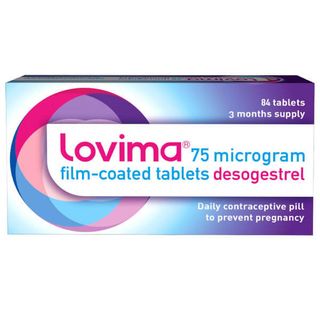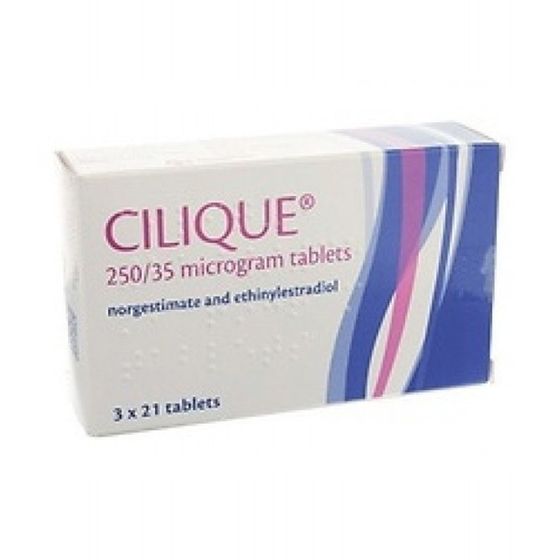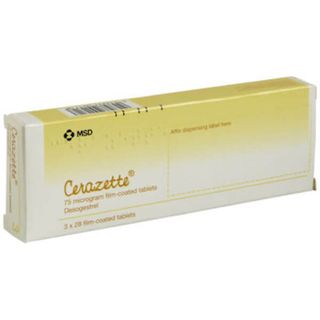
- Fast, discreet delivery
- 100% UK-based pharmacy
- Free advice and support
- We're rated 4.9 out of 5
Based on over 24,000 reviews collected on Google and Reviews.io.
We maintain the highest possible regulation for a UK online pharmacy, ensuring your experience is safe, and confidential.
Cilique Contraceptive Pill
Cilique is a combined hormonal contraceptive pill that offers women up to 99% effective protection against pregnancy. Cilique is a great option for women looking for a pill that is easy to take, reliable and reversible.
You can buy Cilique online from The Independent Pharmacy if it, or an equivalent pill, is currently supplied by your GP. The process is quick and simple: to get your prescription sent directly to your door, simply complete our health consultation for our medical team for review today.
Cilique Information
What is the Cilique contraceptive pill?
Cilique is a form of contraception, known as a combined pill. It contains synthetic versions of both the female hormones oestrogen and progesterone, which are called ethinylestradiol and norgestimate.
Cilique is manufactured by Consilient Health. A box of Cilique tablets contains three strips of tablets each containing 21 tablets. Cilique should be taken each month for 21 days followed by a 7-day pill-free week where most women will experience a withdrawal bleed, like a period. The contraceptive pill is one of the leading ways of preventing pregnancy.
What is Cilique used for?
Like other oral contraceptive pills, Cilique is used by women to prevent pregnancy. It will not, however, prevent the transmission of sexually transmitted infections (STIs).
Cilique may also help some women reduce the symptoms of premenstrual syndrome (PMS), regulating periods to help lighten flow and make them less painful.
How does Cilique work?
A combined contraceptive pill such as Cilique works in three ways to protect you from getting pregnant:
- It stops the ovaries from releasing an egg each month preventing ovulation.
- It thickens the cervical fluid making it more difficult for sperm to reach the egg.
- It alters the lining of the womb to make it harder for a fertilised egg to implant.
When Cilique is taken as directed in the Patient Information Leaflet it is up to 99% effective.
Cilique and acne
Cilique, like other combined contraceptive pills, may improve the condition of some women’s skin, making them less likely to get spots as the hormones can make the skin less oily.
There are, however, some specific treatments, including contraceptive pills that are better at improving skin conditions such as acne. If you are struggling with acne you should discuss this with a doctor who will be able to advise you on the best treatment options.
If you would like more information about acne and treatments take a look at our acne advice page.
Alternatives
The Cilique pill is an effective form of contraception but it isn’t the only option. We’ve listed some of the different treatments that are currently in use, along with a contraceptive that was previously an alternative to Cilique:
Cilest
Both Cilique and Cilest contain the same active ingredients, norgestimate and ethinylestradiol. They also contain the same quantities but are manufactured by different brands so are named differently.
In 2018 Cilest was discontinued in the UK. Following this, Cilique is now widely prescribed as a Cilest alternative.
Levest
Levest contains two hormones; levonorgestrel and ethinylestradiol. It is a widely used combined contraceptive pill and contains the same ingredients as Microgynon and Rigevidon. It is an alternative option to Cilique whilst still being a combined contraceptive pill.
For some women, a progesterone-only (mini) pill may be a better option. Examples of mini pills include:
Cerelle
Cerelle is an oral contraceptive pill that stops you from getting pregnant by preventing ovulation. It contains the active ingredient desogestrel, a progestin medication.
Desogestrel
Desogestrel is a progesterone-only contraceptive pill. Desogestrel tablets contain the active ingredient desogestrel and this prevents pregnancy by stopping ovulation.
Feanolla
Feanolla is a contraceptive pill that doesn’t contain oestrogen. Instead, desogestrel is the active ingredient in Feanolla. Desogestrel acts as a contraceptive by stopping your body from ovulating.
Lovima
Lovima is a contraceptive that you take daily in pill form. Desogestrel is the active ingredient in Lovima and it prevents pregnancy by stopping you from ovulating. Lovima is the first contraceptive to become available without needing a prescription.
Before switching your contraceptive pill, it's a good idea to speak to your doctor, pharmacist or nurse.
Find out more about alternative contraceptive pills or patches
If you would like more information about alternative contraceptive pills or patches that are available on prescription from The Independent Pharmacy, please go to our contraception page. You can also learn about the alternative treatments available by reading our guide to the different types of female contraception.
Sources
Cilique dosage
Cilique tablets can be prescribed by The Independent Pharmacy to adults over the age of 18 years.
- Cilique is for oral use only.
- Take 1 tablet, at the same time each day, for 21 days. Take your first tablet from the top row, marked with the correct day of the week and follow the directions of the arrows printed on the pack.
- After 21 days, have a 7-day pill-free break, where you should expect to have a bleed.
- Start your new pack, after your 7 days pill-free, on the same day of the week that you started your previous pack.
Please read the Patient Information Leaflet carefully before taking Cilique.
Starting Cilique
If you have not used any contraceptive with hormones in the previous month:
Start your first Cilique tablet on day 1 of your period. You are immediately protected against pregnancy. If you start any day after day 1 of your period you should use additional contraception such as a condom for the next 7 days.
Switching from another combined hormonal contraceptive pill:
Start Cilique the day after your last pill from your previous pill packet. Do not have a 7-day pill-free break. If you start Cilique after your 7-day break you will need to use an additional barrier contraceptive such as condoms for 7 days.
Changing from a progestogen-only pill, injection, implant or a progesterone-releasing IUD:
You may switch to Cilique on any convenient day from the progestogen-only pill, or the day of removal of an implant or an IUD and the due date of the injection. In all of these cases, you must use an additional barrier contraceptive such as condoms for 7 days.
After having a baby:
You can start taking Cilique between 21 and 28 days after having a baby. If you start taking Cilique later than day 28 you must use an additional barrier method of contraception such as condoms for the next 7 days.
Cilique and missed pills
If you forget to take your daily Cilique tablet or you are sick or have diarrhoea within 3-4 hours after taking your tablet, take it as soon as you remember or when you feel better, even if this means taking 2 tablets on the same day.
If you are more than 12 hours late taking your Cilique tablet:
- You will not be protected from getting pregnant and should use additional barrier contraception such as a condom for 7 days.
You are at more risk of becoming pregnant if you miss more than one pill within a single packet or if you miss one pill and it’s at the start or the end of your packet. If you think you are at risk of being pregnant while taking Cilique you should speak to a doctor for advice as soon as possible.
If you are less than 12 hours late taking your Cilique tablet:
- You will be protected from getting pregnant. You will not need to use additional contraception.
Cilique Ingredients
The active substances in each Cilique tablet: 250 micrograms of norgestimate and 35 micrograms of ethinylestradiol.
The inactive substance in each Cilique tablet: maize starch, lactose, magnesium stearate (E470b), indigo carmine (E132).
Please read the Patient Information Leaflet carefully before taking Cilique.
Cilique side effects
Some people will experience side effects when taking a combined oral contraceptive pill like Cilique, such as Cilique pill weight gain. Most people will find that their symptoms settle within the first 3 months. If you do not notice any improvement after this time or are concerned about any side effects you should speak to a doctor or pharmacist for advice.
If you experience any severe side effects such as yellowing skin, upper abdominal pain or convulsions or you have an allergic reaction while using Cilique you should either call 999 or attend your nearest emergency department as soon as possible.
The most common Cilique pill side effects are:
- Headaches or migraines
- Feeling or being sick or diarrhoea
- Bleeding between periods or no bleeding
- Mood changes
- Difficulty sleeping
- Acne
- Muscle spasms in arms and legs
- Painful breasts
- Urinary tract infections
- Vaginal thrush and discharge
- Weight gain.
- Hair thinning or excessive hair growth
- Changes in appetite
- Change in sex drive
Please read the Patient Information Leaflet contained within the medicine packaging carefully before taking Cilique for full details of reported side effects.
Cilique warnings
Before taking Cilique please read and make sure you have understood all the warnings and precautions associated with taking combined oral contraceptives detailed in the Patient Information Leaflet.
Cilique can make some existing conditions worse and increase your chances of certain health conditions. If you start taking Cilique you will therefore need to continue to have your health monitored at least once a year.
- You should not take Cilique if you have ever had a blood clot, problems with your heart or liver, or you are at risk of having a stroke or suffer from migraines.
- You also should not take Cilique if you have high blood pressure, have high levels of fat in your blood or have ever had breast cancer or cancer of the genital organs.
- You should consult with your doctor before taking Cilique if you have diabetes, inflammatory bowel disease, sickle cell anaemia, HUS or SLE or if you have a disease that first appeared during pregnancy.
- You should tell your doctor if you have recently been taking or are currently taking any other prescribed or non-prescribed medication including herbal remedies such as St. John’s Wort.
Cilique and blood clots
The use of combined hormonal contraception, including Cilique, can enhance a woman's
risk of forming arterial and venous blood clots or venous thrombosis.
The risk of developing blood clots increases:
- Throughout the first year of taking a combination pill
- As you get older
- If you are overweight
- If someone in your family has suffered from blood clots
- After you have had an operation or had an extended period of immobilisation
Blood clots can be serious and even fatal when leading to heart attacks and strokes. If you think you are experiencing symptoms of a blood clot see a doctor immediately.
Cilique and cancer
Taking combined pills for contraception, such as Cilique, can very slightly increase the risk of developing breast cancer. This risk appears to reduce once you stop taking any form of contraception.
Women taking Cilique must regularly check their breasts for any changes and you should contact your doctor if you are concerned.
Cilique in pregnancy & breastfeeding
You should not take Cilique during pregnancy and if you think you have become pregnant while taking Cilique you should speak to a doctor for guidance.
Taking Cilique while breastfeeding is also not recommended, you should speak to a doctor or nurse for advice about your contraceptive options.
Cilique Pill reviews
Related Treatments
Visit our Contraception page for treatments, advice and FAQs.
Ordering as easy as 1, 2, 3
1. Find the ideal treatment
2. Get a free consultation
3. Enjoy speedy delivery



